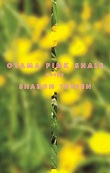Sharon Thesen. Oyama Pink Shale. Toronto: House of Anansi, 2011.
~ reviewed by Andrew Vaisius
I’ve read Sharon Thesen’s poetry for about 30 years, yet she continues to surprise me with simple observations—simple nearly to the point of being obvious, and obvious as a short sweet shuffle to totally delightful: “iron filings hopelessly in love / with a toy magnet” (“The nets of Being”); even when the image is not meant to inspire delight, it stirs wonder: “the abacus / of suffering” (“The Torturer’s Horse”).
Thesen’s poems percolate in calculated understatement and casual conversational rhythms:
I like it here where dirty cars idle at traffic lights
& pallid Valentine’s shoppers tiptoe over beige slush
to purchase in the Humour section
chastening truths re. the body’s dismay. (“February”)
Thesen writes with a sceptic’s eye for human triumph and discovery when stacked up against corporate degradations all over the world., whether in the tar sands or as nuclear meltdowns. She records without placards and protests, and allows the reader to fill in the blanks: “below radioactive / cliffs of Oyama pink shale” or “far away from Roundup / and technologies of Krupp” (“Five Preludes”). On the blowing up of Ripple Rock in British Columbia, she notes that “sadness befell us for the hauling out / of the busted underworld into the fuming light of day” (“Ripple Rock”), making it sound less like a human triumph over Nature than a hesitant admission of guilt for causing such a wrenching un-natural change in the world.
I do not detect a major stylistic variation over the years in her work since what she says in her poetry has always taken prominence over how she physically lays out the poems. The subtlety in her work derives from the conversation with her readers. I imagine her offering a chair and hot tea, and the reader finding a growing comfort and understanding at work here. “The Shepherdess” provides an excellent example of Thesen’s careful invitation to her readers. Beneath the title is the descriptor “A painting in oils, 1899.” The first stanza paints a picture of the painted picture, with exacting adjectives evoking the correct shading. It’s only in the ninth line, when she asks, presumably of the sheep, “Why would anyone just take off, or be bad?” that we get an inkling of contradiction and malevolence off the canvas. She goes on to assure us that “immanence reigns. It moves softly forward” as the tension builds. The perspective returns to the painter, likely an older man, regret loading up his brush.
Thesen’s work urges us to look again. The poem “Death in the Moonlight, a Sinking Canoe,” dedicated to a nephew who drowned, ends with the canoeist making a fateful decision about which direction to swim. “Who wouldn’t try to swim there instead? // Even though it was the longer way.” He posits not an end with his decision, but a successful swim to shore. I do not see the dilemma as one of panic: he swims the longer way because he believes he will succeed. We do not hope to attain what we know is certainly beyond our reach. There is no swagger in Thesen’s poetry. She doesn’t push or pressure, but reveals the blue depths of life in all their complexity.
Regular Arc reviewer Andrew Vaisius has for 14 years directed a children’s daycare centre in Winkler, Manitoba, where he lives and writes.


